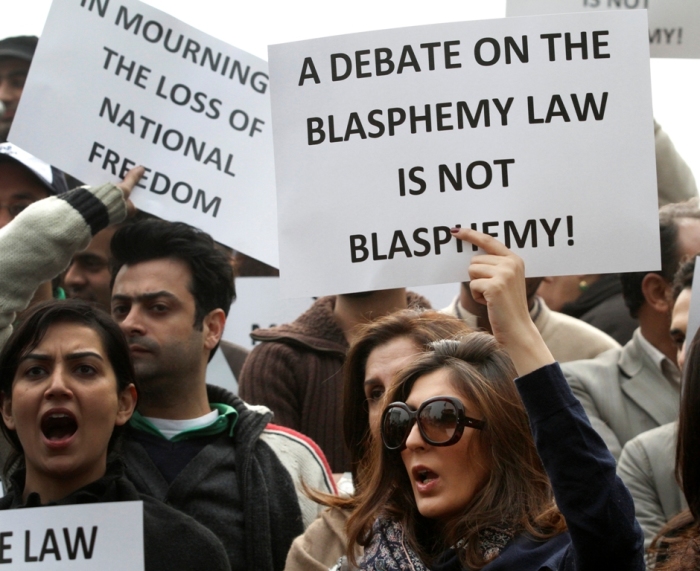2 Pakistani Christians charged with blasphemy for defending faith, may face death penalty

Two Christian evangelists were charged with violating Pakistani blasphemy laws for allegedly offending Muslim sentiments and could face a death sentence if found guilty.
Evangelists Haroon Ayub Masih Masih and Salamat Mansha Masih were preaching at Model Town Park in Lahore on Feb. 13, when they were approached by Haroon Ahmad, a Muslim, and gave him a book titled “Water of Life,” according to the United States-based persecution advocacy organization International Christian Concern.
A police report shows that the men discussed the divinity of Jesus Christ and the prophets, which led to an argument. An ICC report states that Ahmad eventually accused the Christians of making derogatory claims about Islam.
Police charged the Christians with committing blasphemy under sections 295-A, B and C of Pakistan’s Penal Code. The two Christians could face execution if found guilty of Section 295-C.
“We here at International Christian Concern are concerned for the safety of the Haroon Ayub Masih and Salamat Mansha Masih,” ICC Regional Manager William Stark said in a statement. “We are also concerned for the safety of the broader community these men represent.”
Open Doors USA President David Curry said even though blasphemy laws are prevalent in other Islamic-majority countries, they are by far the worst in Pakistan and require little to no evidence for a charge. Because of this, Christians are “in grave danger.”
Blasphemy accusations in Pakistan are often sparked by personal vendettas or religious hatred and sometimes lead to mob lynching, murders and protests.
“The blasphemy laws, I think, are one of the most heinous tools used against religious minorities, particularly Christians…,” Curry told The Christian Post. “What it allows people to do is to accept unsubstantiated charges against one person by another person. It has given rise to mob violence and vigilante justice.”
The Sunni Muslim-dominant country also uses blasphemy laws against Shia Muslims and other religious minorities.
“It’s almost as though they want to force conformity,” Curry said. “They want them to have thought control over what people believe, what people should say. I believe everyone should have the right of freedom of conscience, to be able to choose for themselves what they believe, what they read, what scriptures they read, or if they have no faith at all.”
Pakistan ranks as the fifth-worst country in the world when it comes to Christian persecution, according to Open Doors USA’s 2021 World Watch List, due to Islamic extremist oppression. The country is also listed as the second-most dangerous country in Asia for Christians.
Human rights activists have advocated for decades to reform the blasphemy laws that disproportionately charge religious minorities, often based on false accusations, according to the U.S. Commission for International Religious Freedom.
USCIRF says the “vague provisions” found in sections 295 and 298 of Pakistan’s Penal Code criminalize any speech or acts “insulting a religion or belief or defiling the Quran, the [Islamic] prophet Muhammad, a place of worship, or religious symbols.”
Blasphemy charges often result in vigilante violence or the violation of legal procedures. Many of the accused individuals never reach the courtroom.
Nasir Saeed, director of United Kingdom-based Centre for Legal Aid, Assistance and Settlement, a Christian organization that addresses religious persecution in Pakistan, said the blasphemy laws in Pakistan are supported by the government, which makes them almost impossible to be repealed.
Some countries have repealed their blasphemy laws, such as Sudan which repealed its blasphemy laws last year.
Saeed told CP that Christians in Pakistan can go to church, but evangelizing outside of church walls is difficult and virtually non-existent due to the danger.
Curry said Christians can be charged with blasphemy just by claiming to follow Jesus.
“It’s not even about evangelization,” Curry said. “It’s about people’s free will to practice their faith privately. That’s what’s so shocking about it. These are people who are just living their faith peacefully; they’re not forcing it on anybody. If asked, they want to be able to say they’re followers of Jesus, and with this, they’re charged with blasphemy.”
In January, a 30-year-old Christian nurse in Pakistan was falsely accused of blasphemy by a Muslim co-worker after a personal dispute, though no evidence was presented. Videos surfaced of the nurse being attacked and tied up with ropes by co-workers before police arrived. She and her family are now in hiding for fear of vigilante violence.
Twenty-four Christians are being held in Pakistani prisons based on blasphemy charges, according to the ICC report.





























